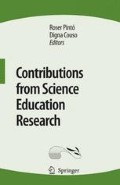Abstract
This chapter describes the formulation of a model of formative assessment as it has emerged through a series of collaborative research and development activities with teachers. The aspiration is to articulate our emerging understanding of a complex set of interacting factors in an integrated and coherent manner. Though necessarily tentative, the model will serve to guide our future research activities as well as offering a perspective on the research of others. A specific approach to conceptual change is at the heart of the model, which attempts to extrapolate from constructivism as a theory of learning to its applications to the practice of teaching. Our approach integrates domain-specific elements – hypothesised conceptual trajectories that re-occur in science learning – with domain-general elements. The latter describe recurring cycles of interaction between teachers and pupils that might occur in any curricular domain. Some of the cost-benefits to teachers in their approach to the implementation of formative assessment practices are discussed. It is suggested that an implication of the suggested approach is the need to conduct and share more empirical research into pupils’ conceptual development, nationally and internationally
Access this chapter
Tax calculation will be finalised at checkout
Purchases are for personal use only
Preview
Unable to display preview. Download preview PDF.
References
Alexander, R. (2004). Towards dialogic teaching: Rethinking classroom talk. (Second edition. Cambridge: Dialogos)
AAAS (2001). Atlas of scientific literacy. Project 2061. (American Association for the Advancement of Science. National Science Teachers’ Association, Co-publisher)
Bell, B. & Cowie, B. (2001). Formative assessment and science education. (Dordrecht, Kluwer Academic Publishers)
Black, P. J. & Wiliam, D. (1998). Assessment and classroom learning. Assessment in education: Principles, policy and practice. (Vol. 5, No. 1, pp. 7–74)
Black, P. J. & Wiliam, D. (2006). Developing a theory of formative assessment. (In J. Gardner (Ed.), Assessment and learning (pp. 81–100). London: Sage)
Black, P. J., Harrison, C., Lee, C., Marshall, B. & Wiliam, D. (2003). The nature and value of formative assessment for learning. (American Education Research Association. Chicago, April 2003)
Bruer, J. T. (1996). Classroom problems, school culture, and cognitive research. (In K. McGilly (Ed.), Classroom lessons: Integrating cognitive theory and classroom practice (p. 290). Cambridge, MA: MIT press)
Driver, R., Guesne, F. & Tiberghien, A. (1985). Children’s ideas in science. (Milton Keynes: Open University Press)
Duschl, R. (2003). Assessment of inquiry. (In J. M. Atkins & J. Coffey (Eds.), Everyday assessment in the science classroom (pp. 41–60). Arlington, VA: NSTA Press)
Duschl, R. A. & Gitomer, D. H. (1997). Strategies and challenges to changing the focus of assessment and instruction in science classrooms. Educational Assessment, 4(1), 37–73
Flutter, J. & Ruddock, J. (2004). Consulting pupils: What’s in it for schools? (London: Routledge Falmer)
Karmiloff-Smith, K. (1992). Beyond modularity: A developmental perspective on cognitive science. (Cambridge, MA: MIT press)
Kennedy, C. (2005). The BEAR assessment system: A brief summary for the classroom context. Retrieved October 3, 2006, from http://bearcenter.berkeley.edu/publications/pubs.php
Rowe, M. B. (1974). Wait time and rewards as instructional variables, their influence on language, logic and fate control. Journal of Research in Science Teaching, 11, 81–94
Ruiz-Primo, M. & Furtak, E. M. (2004). Informal formative assessment of students’ understanding of scientific enquiry. (Centre for the Study of Evaluation (CSE) Report 639)
Russell, T., McGuigan, L. & Hughes, A. (1998). Forces. Science process and exploration research reports. (Liverpool: Liverpool University Press)
Russell, T., McGuigan, L., Roberts, D. & Hughes, A. (2001). Science optional assessment materials for KS1, 2 and 3. (ACCAC)
Russell, T. & McGuigan, L. (2002). Promoting understanding through representational redescription: an illustration referring to young pupils’ ideas about gravity. (In D. Psillos, P. Kariotoglou, V. Tslfes, E. Hatzikraniotis, G. Fassoulopoulos & M. Kallery (Eds.), Science education research in the knowledge-based society (pp. 61–68). (Dordrecht: Kluwer Academic Publishers)
Russell, T. & McGuigan, L. (2003). Assessing progress in science KS1, 2 and 3. (Qualifications and Curriculum Authority)
Russell, T. & McGuigan, L. (2005). Assessing progress in science INSET Toolkit KS1, 2 and 3. (Qualifications and Curriculum Authority)
Tiberghien, A. (2000). Designing teaching situations in secondary school. (In R. Millar, J. Leach & J. Osborne (Eds.), Improving science education: the contribution of research. (pp. 27–47). Buckingham, UK: Open University Press)
Wiliam, D., Lee, C., Harrison, C. & Black, P. J. (2004). Teachers developing assessment for learning: impact on school achievement. Assessment in education: principles, policy and practice, 11(1), 49–67
Wilson, M. & Sloane, K. (2000). From principles to practice: An embedded assessment system. Applied Measurement in Education, 13 (2), 181–208
Editor information
Editors and Affiliations
Rights and permissions
Copyright information
© 2007 Springer
About this paper
Cite this paper
Russell, T., McGuigan, L. (2007). Development of a Model of Formative Assessment. In: Pintó, R., Couso, D. (eds) Contributions from Science Education Research. Springer, Dordrecht. https://doi.org/10.1007/978-1-4020-5032-9_14
Download citation
DOI: https://doi.org/10.1007/978-1-4020-5032-9_14
Publisher Name: Springer, Dordrecht
Print ISBN: 978-1-4020-5031-2
Online ISBN: 978-1-4020-5032-9
eBook Packages: Humanities, Social Sciences and LawEducation (R0)

